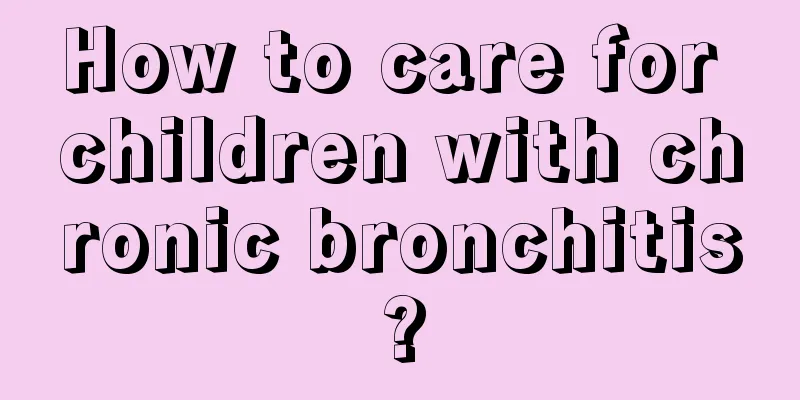How to care for children with chronic bronchitis?

|
People often say "old chronic bronchitis", but in fact children can also suffer from "minor chronic bronchitis". Babies have fragile bodies and they feel very uncomfortable when suffering from bronchitis. At this time, parents must learn to take good care of their babies' bodies to help them recover as soon as possible and reduce the pain of the illness. Let’s take a look at the introduction to pediatric bronchitis care compiled by the editor. 1. Keep warm. Temperature changes, especially cold stimulation can reduce the local resistance of the bronchial mucosa and aggravate bronchitis. Therefore, parents should add or remove clothes for their children in time as the temperature changes, especially cover the children with quilts when sleeping to keep the body temperature above 36.5℃. 2. Feed more water. Children with bronchitis have varying degrees of fever and a large amount of water evaporation, so you should pay attention to feeding the children more water. It can be supplemented with sugar water or sugar and salt water, or with rice soup or egg soup. The diet is mainly semi-liquid to increase the water content in the body and meet the body's needs. 3. Adequate nutrition. When children suffer from bronchitis, they consume a lot of nutrients. In addition, fever and bacterial toxins affect gastrointestinal function and cause poor digestion and absorption. Therefore, nutritional deficiencies in the children's bodies cannot be ignored. 4 Turn over and pat your back. When the child coughs and expectorates, it indicates that the bronchial secretions have increased. In order to promote the smooth discharge of secretions, nebulizer inhalation can be used to help expectorate, 2-3 times a day, each time for 5-20 minutes. If it is an infant, in addition to patting the back, you should also help the child turn over once every 1-2 hours, so that the child remains in a semi-recumbent position to facilitate the discharge of phlegm. 5. Reduce fever. Children with bronchitis usually have a low-to-moderate fever. If the body temperature is below 38.5℃, there is generally no need to give antipyretics. Treatment should focus on the cause of the disease to solve the problem fundamentally. If the body temperature is high, older children can be cooled physically, such as by applying a cold towel to the head or bathing with warm water. However, this method is not suitable for young children, and medication should be used to reduce the temperature if necessary. After reading the above care methods taught by the editor, parents must have a new understanding. In addition, the baby's respiratory tract is directly related to the air. To maintain a good family environment, the child's room should be warm, well ventilated, and have a certain humidity in the air to prevent excessive dryness. Doing the above is helpful in preventing chronic bronchitis. |
<<: What foods are good for peptic ulcer?
>>: What are the symptoms of vitiligo in children?
Recommend
How to treat indigestion in children
Since children's digestive systems are still ...
What should a three-year-old baby eat if he is constipated?
The physical fitness of a three-year-old baby is ...
Why does my baby have a stuffy nose?
Many people will encounter the phenomenon of chil...
Tips for children's health in spring
In fact, in the spring season, bacteria often beg...
What to do if your baby's hands and feet are hot
Children will definitely have some adverse sympto...
How to treat cough in eight-month-old baby
We all know that babies have poor physical fitnes...
What to do if your three-year-old baby has a partial eclipse
Children of this era are extremely happy. They ha...
How is the vision of a full-month baby?
When a child is just born, parents still need to ...
What can a seven-month-old baby eat?
Children and the elderly both need care. When rai...
When is the feeding time for newborn baby?
Raising a baby is a very important thing. Many fi...
Solutions for newborn baby frowning
We may have seen many children frowning. This sit...
What should I do if my newborn baby has blue eyes?
For every family, they want their newborn to be h...
What's a good solution for headaches?
Headaches not only occur in adults, but children ...
What to do if your child's myocardial enzyme is high
Any health indicator has a normal range. If it is...
Prevention of influenza in children
Autumn and winter are the seasons when influenza ...









